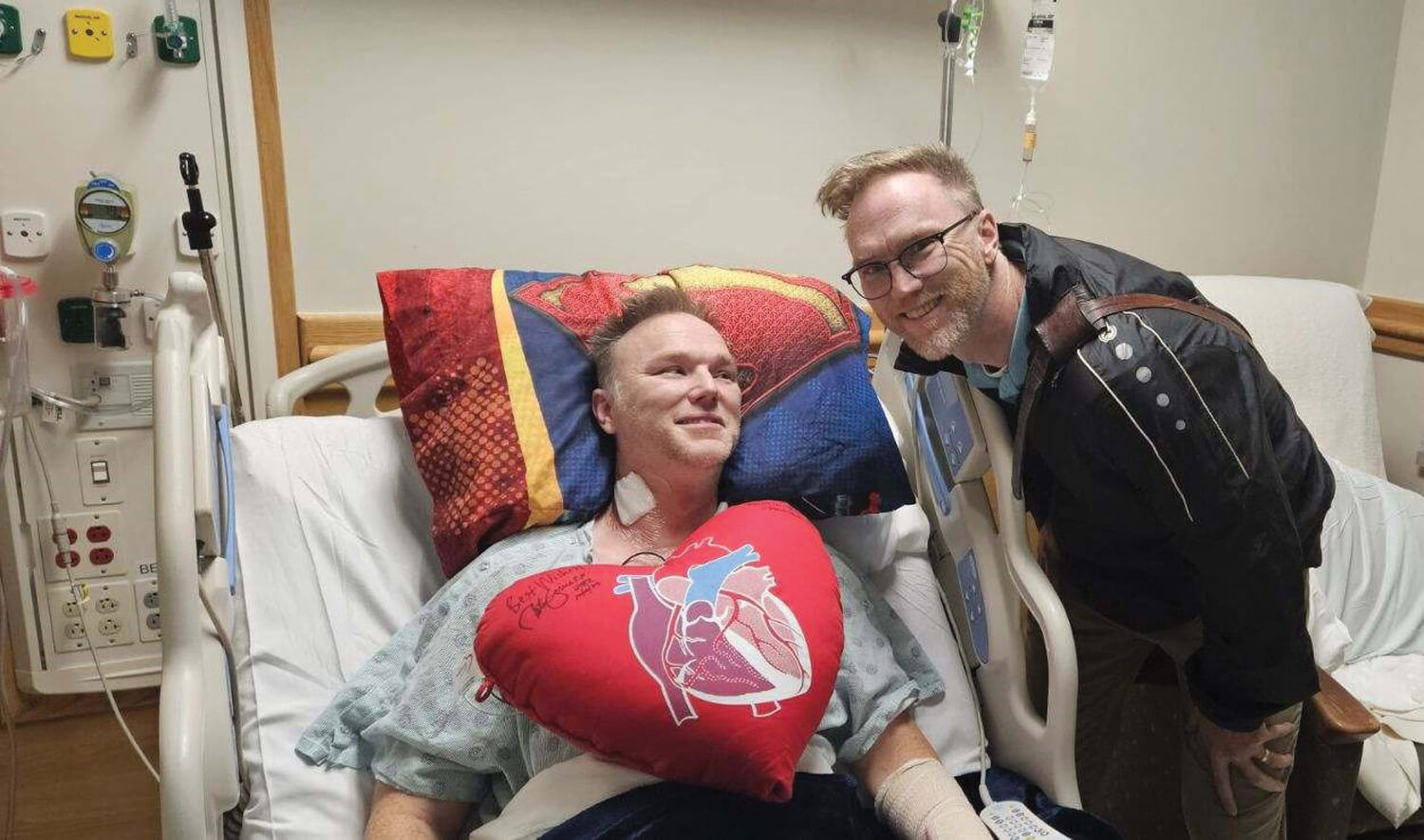A WSAZ meteorologist credits a Marshall cardiology doctor’s quick thinking in the identification of a serious heart problem.


On paper, Brandon Butcher was the picture of health. The 47-year-old meteorologist exercised six days a week. He paid attention to what he ate, and his vital signs at his regular check-ups with his primary care physician were always good. He and his wife, Mary, are active parents to four children—one in college and three at home. That’s why Butcher didn’t think much of a deep shoulder pain he experienced when he woke up on October 6, 2023.
He headed into work around 1 a.m. to track weather patterns and share his forecasts on WSAZ’s morning news programs for the Charleston–Huntington area. He was used to some muscle discomfort from his workout routines. He called the feeling “too deep to stretch out or massage away.”
By the time he was on camera that morning, Butcher says the pain had moved closer to the left side of his chest, but it still didn’t feel like anything of grave concern. “I just thought it was weird and annoying,” he says. “I was always one of those people that, if I go for a run and it’s hard at the end, I’ll just push through it, because otherwise I won’t get better—no pain, no gain.”
Only when he began to have trouble breathing did he realize he may need help. “I’m not having some good health right now,” Butcher said live on the air.
The morning anchor had walked away from his desk, so Butcher was alone in the room. “I noticed my body started to get flush, and my left side started getting weak,” he says. “I didn’t know what to do.” He stepped off camera and managed to walk out of the studio and down the hall to his producers. He indicated to them that he was in distress—all while continuing to deliver the forecast by microphone.
Butcher ended up at Cabell Huntington Hospital and, later, St. Mary’s Medical Center, where he received most of his care. He is thankful that his wife, a physician assistant, could be with him. “With Mary there, I could better communicate with the doctors,” Butcher says. “I liked each one of them. They each had a different style, but they were all very knowledgeable in their different areas of expertise.”
After CT scans and a stress test didn’t show major issues with his heart, Mary requested a cardiac catheterization, more commonly referred to as a heart cath, to see what was going on inside of his heart. The test showed that three of the arteries in his heart had 70% blockages. Another had a 50% blockage.
In a matter of days, Butcher underwent quadruple bypass surgery. He didn’t understand how this could have happened. His father had an ascending aortic aneurysm, but he otherwise had no indication that he was at-risk for a cardiovascular event. “Based on all my lifestyle indicators and vitals up to that point, I should not be in any risk category,” he says.
Because he mentioned a family history of ascending aortic aneurysm, his lipoprotein (a) level was tested while he was in the hospital. Butcher learned he had an abnormally high level of lipoprotein (a), which he says made his cholesterol “extra sticky,” causing it to build up in his coronary arteries more easily.
Butcher was started on a statin medication to lower cholesterol, but his body did not tolerate it well. After he was discharged, he was referred to N. Andrew Vaughan, M.D., M.B.A., an experienced preventive cardiologist with Marshall Health. Vaughan reviewed Butcher’s options to more aggressively lower his cholesterol without using statins. While agents to lower lipoprotein (a) are being rigorously tested in medical trials, they are not yet available. The goal at this point was to lower his cholesterol as much as possible to offset the risk posed by lipoprotein (a).
Butcher went back to work in December, and he is back to regular exercise, although his diet is leaner than it was before. He and his care team—which includes Brittany Messer, PharmD, a Marshall Health cardiology clinical pharmacist—are focused on his long-term recovery and making sure he is taking care of himself and his medications.
More than anything, Butcher wants other people to know how easy it is to get their lipoprotein (a) levels tested. “It’s a simple blood test,” Butcher says. “I don’t know why people don’t get it all the time.”
Vaughan agrees. “While the testing is relatively new, I recommend anyone whose family or personal medical history includes premature cardiovascular disease or a history of heart disease should talk to their doctor about a lipoprotein screening,” he says. After Butcher’s cardiac episode, his twin brother tested and found out he also had an abnormally high level of lipoprotein (a).
According to the American Heart Association, about one in five people have abnormally elevated lipoprotein (a). It is undetectable without a specific screening laboratory blood test. Even people who regularly exercise and have healthy eating habits can unknowingly have elevated lipoprotein (a) levels, since diet and exercise do not lower them.
“I got lucky that I avoided a heart attack and still got my bypass, but I don’t want doctors to pick up people at bypass,” Butcher says. “There are so many people that can avoid what I had happen to me.”
To learn more about Marshall Cardiology and its services, visit marshallhealth.org/cardiology or call 304.691.8500.
READ MORE ARTICLES FROM WV LIVING HEALTHY
READ MORE ARTICLES FROM SPRING 2024











Leave a Reply